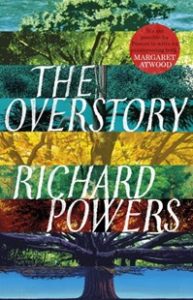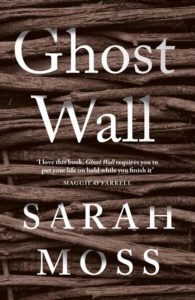 I started reading this long book by Richard Powers and found the beginning a little tiring (over-detailed, slow). It starts with a pioneering family in the US and the (odd) obsession by one of them with documenting the growth from seed of a chestnut tree (at this time a chestnut blight was systematically wiping out whole ancient forests). Then we abruptly leave this story and move on to another one of a Chinese man immigrating to the US taking with him an ancient scroll. This is how the novel develops, moving from one story to the next, starting with the background of characters, and then following their families. They all, in one way or another, have a connection to trees – although this is sometimes tangential. I don’t know if I would have persisted with The Overstory if I hadn’t decided to listen to the audiobook, rather than read the paper one. I just relaxed back and took in this big, wide-ranging, detailed book with its huge cast of characters. I’m not sure how many main storylines we follow; maybe nine?
I started reading this long book by Richard Powers and found the beginning a little tiring (over-detailed, slow). It starts with a pioneering family in the US and the (odd) obsession by one of them with documenting the growth from seed of a chestnut tree (at this time a chestnut blight was systematically wiping out whole ancient forests). Then we abruptly leave this story and move on to another one of a Chinese man immigrating to the US taking with him an ancient scroll. This is how the novel develops, moving from one story to the next, starting with the background of characters, and then following their families. They all, in one way or another, have a connection to trees – although this is sometimes tangential. I don’t know if I would have persisted with The Overstory if I hadn’t decided to listen to the audiobook, rather than read the paper one. I just relaxed back and took in this big, wide-ranging, detailed book with its huge cast of characters. I’m not sure how many main storylines we follow; maybe nine?
Some are more compelling than others. I liked Patricia, a deaf, taciturn and withdrawn plant expert who goes against the conventional wisdom and does research into tree communication (of course, now it is accepted that trees communicate, help and protect each other; even those of different species). I also liked Douglas, an ex-military dropout loner who sees the light in middle age when he encounters clear felling and the practice of the logging companies of leaving a façade of trees along roads, and at the edge of logging coups, to fool the public. He does his bit by joining a regreening work gang replanting seedlings for a logger, until he finds out that by doing this, the company gets a licence to log even more. There is also an Indian quadriplegic programmer who gets rich inventing a game called Mastery, where you start with a virgin planet and develop and civilise it (it takes him a long time to see the implications of this and try to make amends).
As the narrative progresses, some of the characters meet, come together, and protest logging. Peaceful protest is met by force and our small group decide to take more active measures. The consequences of this are far ranging and provide the main narrative thrust of the novel but this is not a linear narrative and Powers is not about to provide any easy answers. I had the feeling often about this book that it was about to end – some profound point had been made, some realisation of a main character’s – but it went on, often switching between storylines at these moments. I won’t spoil the end, but it is in keeping.
My defences were worn down by the narrative; it was relentless, and beautifully and powerfully written, with a cynicism of humanity that I agree with wholeheartedly. I was stuck with the characters, I had to go with them and when it finished, I had that sensation that something deeply satisfying had left me. The ending makes you think about the whole and I realised Powers was doing something interesting with the structure (hint the sections are titled Roots, Trunk, Crown, Seeds). The various sections start out with ‘roots’ – the family history or background of the characters, then they grow independently branching out. I like to think that the little revelations, or narrative stops, I noticed, were the ends of the twigs growing out from the branch. In the end, you just have to step back, take in the whole, and accept it for what it is. Whether you are convinced by the ‘seeds’, I’ll leave up to you.
I think this book is a pretty staggering achievement (apart from everything else, it is highly erudite on a wide range of topics). It reminded me of Middlemarch where Eliot developed the same sense of community and loose interconnectedness, and I felt the same sadness at having to move from that novel as I did with The Overstory.


